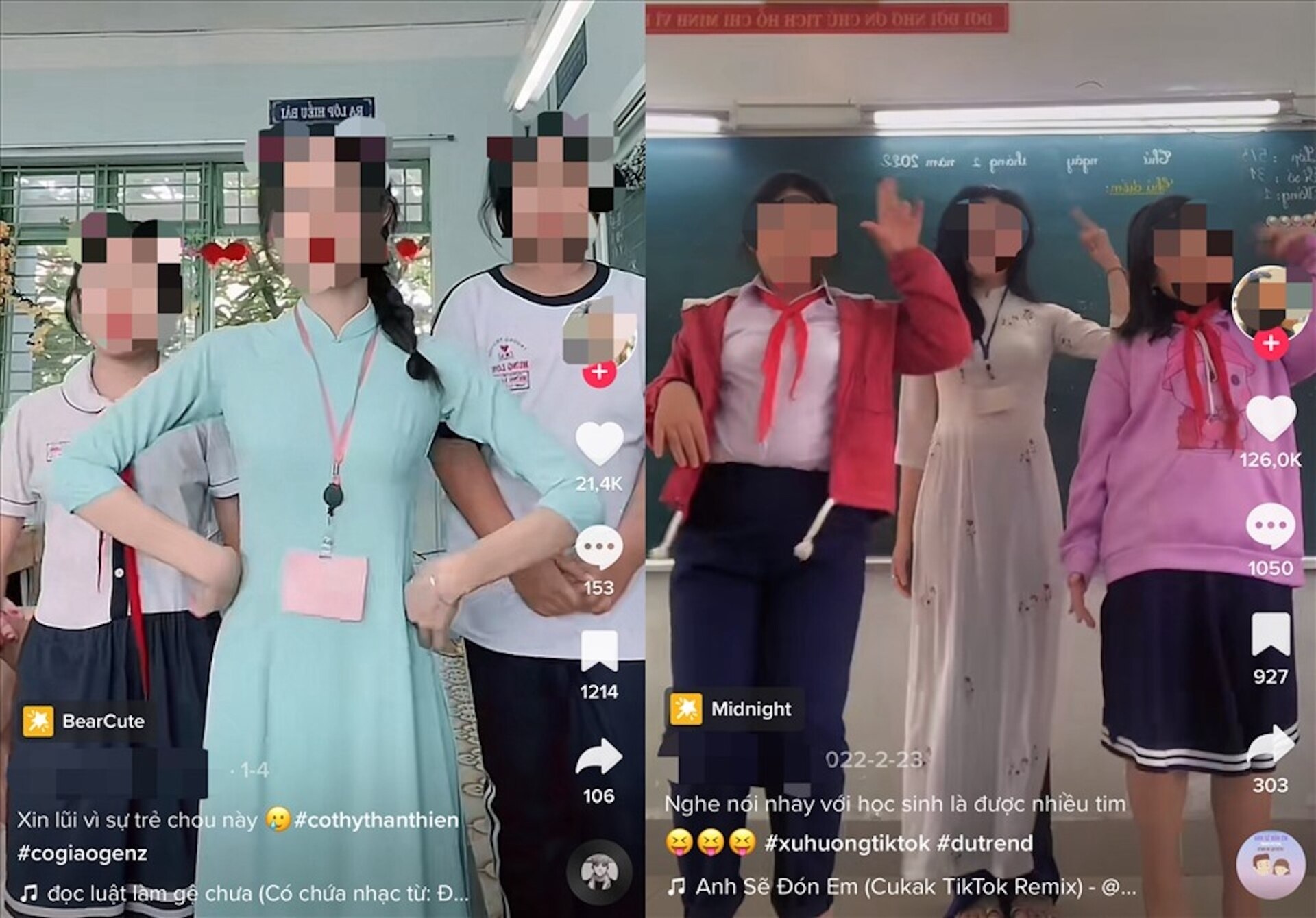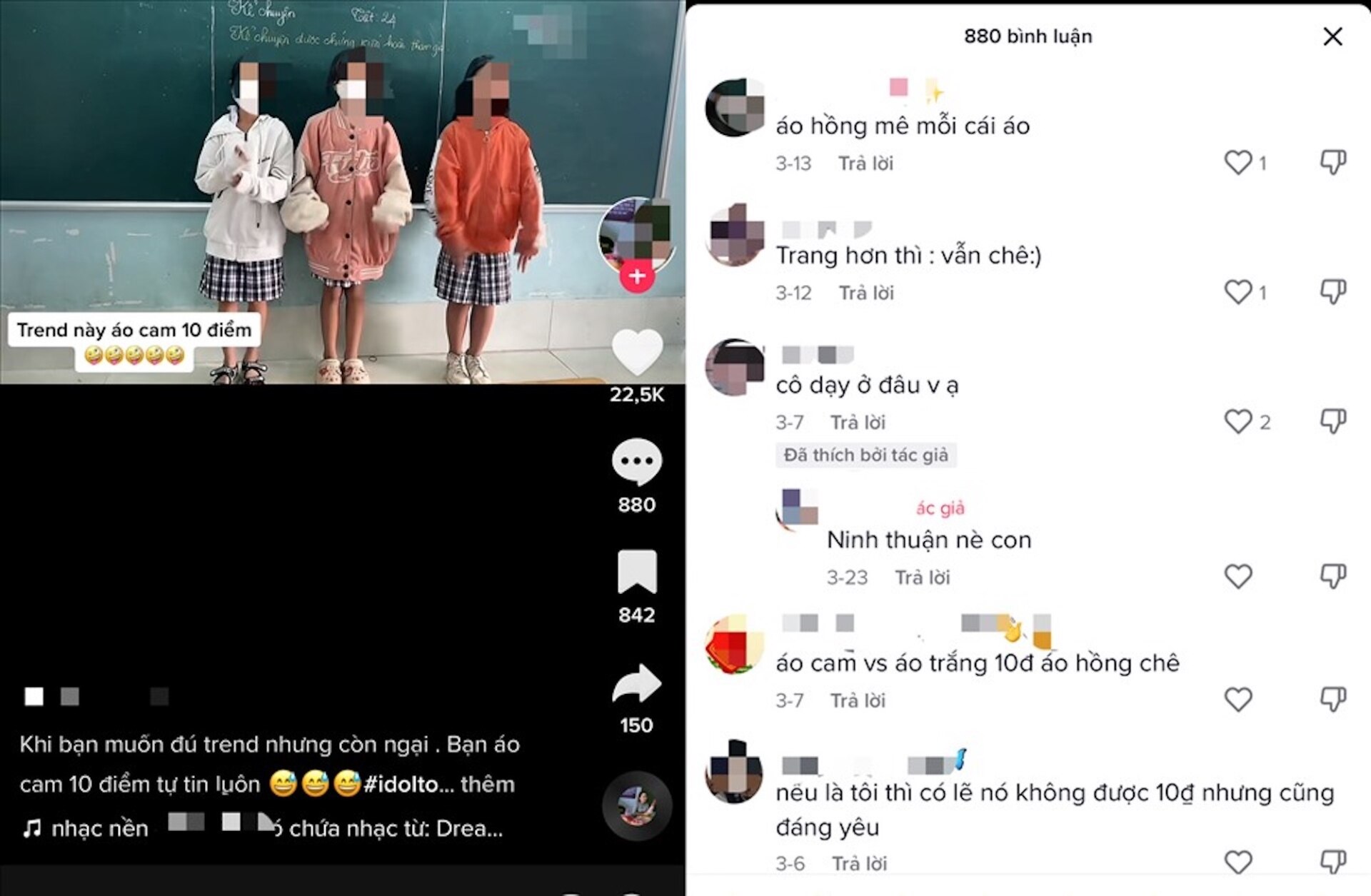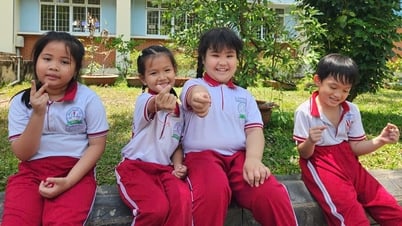TikTok rotating stage podium
"Please remove the TikTok clip with my son Bin. I don't want his image or information to appear online," the message was sent by Ms. Tran Le Bich Ngoc (37 years old, Cau Giay, Hanoi ) to her son's homeroom teacher. Ms. Ngoc's son is in 3rd grade at an elementary school in Nghia Do ward, Cau Giay, Hanoi.
Yesterday afternoon, while sitting at work at the office, a colleague suddenly showed Ms. Ngoc a TikTok clip of a teacher wearing sunglasses standing in front of the podium with 4 students standing behind her dancing the "fan dance, quay dan to". She was shocked to discover that among the students dancing was her son.

Teachers regularly post clips of themselves dancing with students on TikTok.
After watching the clip, she was worried about TikTok, the age-inappropriate dances would have a negative impact on her son. After consulting her husband and colleagues, she decided to text the homeroom teacher to ask her to remove the clip from TikTok, saying that "the family does not want their child to be exposed to this social networking platform and is afraid of revealing personal information and images."
At home, outside of studying time, her family only lets Bin watch cartoons on TV or Youtube, and forbids watching dancing clips or livestreaming on TikTok and Facebook. Clips posted on these platforms are often uncensored in terms of content, with many vulgar words, revealing clothes, and behaviors that are not suitable for young children. "If not strictly controlled, children can easily learn and unconsciously become dangerous habits," said the parent.
Ms. Ngoc also shared that she gradually lost sympathy for the teacher after watching a series of clips of her dancing and wriggling on TikTok.
Ms. Nguyen Van Anh (38 years old, Vinh Yen, Vinh Phuc ) also fell into a similar situation. The young teacher at the school recorded a clip of herself dancing with her daughter on the podium and posted it on TikTok. After that, the clip received a storm of criticism about her dancing, beauty... from the online community. Many malicious people even commented, "She's so ugly but still confident in dancing", "she doesn't dance well but still shows off", "teacher and student look like two girls who have run away from home"...
"My daughter burst into tears and confided in me about receiving so many negative comments. I was surprised and didn't understand what was going on until I saw the clip posted by the young teacher," said Ms. Van Anh.
This parent believes that the teacher posting pictures of her students on TikTok may just be to show off the close relationship between her and her students. However, these videos may unintentionally hurt the students because they become the focus of discussion.
Ms. Van Anh's family limits posting pictures of their children on social media to avoid being taken advantage of by bad people. Therefore, she decided to report to the teacher to respect the children's pictures and not to post them on social media without the parents' permission.
Regardless of views
Ms. Nguyen Phuong Anh (47 years old, Chu Van An Primary School, Hanoi) was surprised when watching videos posted by teachers on TikTok, "young teachers are so confident, daring to post photos of themselves writhing and wearing low-cut dresses on TikTok". A veteran teacher like Ms. Phuong Anh has never dared to wear low-cut, off-shoulder or knee-length dresses to class, which is very offensive and difficult to teach students.

Many clips of students dancing on TikTok receive both praise and criticism.
Regarding TikTok clips, Ms. Phuong Anh commented that most of them were staged and filmed by students using their phones. Many teachers livestreamed their lessons while "criticizing" students for not doing their homework and being lazy. Surprisingly, such clips received thousands and millions of views from the online community with both praise and criticism.
However, according to her, this practice is highly condemnable and absolutely prohibited in schools. Teachers using phones or recording videos in the classroom will more or less affect children's study time. At the same time, the regulation also limits teachers from using phones during class, not for teaching purposes.
Instances where teachers use mobile phones during school lessons are usually to record the classroom as a model lesson at the request of the professional council and the school board.
According to Ms. Phuong Anh, most of the clips on TikTok are by young teachers who are new to the profession. These young teachers often take advantage of the time to film clips during recess.
Ms. Hoang Thu Vinh (Tan Binh District, Ho Chi Minh City) believes that if teachers want to be closer and more intimate with students, they can carry out many different common activities, instead of asking students to dance and act on TikTok. When the video becomes a trend, children can easily become the subject of mixed comments (including positive and negative) from the online community.
This female teacher believes that teachers who regularly record TikTok videos during class or force students to appear in videos can also cause parents to misjudge the image of teachers.
Above all, she is concerned about the children's privacy being violated. Teachers need to respect children's images and ask for their opinions before posting content on social networks. Absolutely do not post arbitrarily, even if it is an image of a student winning a high academic award.
Violation of children's rights
The law currently clearly stipulates provisions to protect children's privacy. Specifically, Clause 11, Article 6 of the 2016 Law on Children prohibits the act of publishing or disclosing information about children's private lives and personal secrets without the consent of the child or their parents or guardians.
In addition, Clause 1, Article 36 of Decree No. 56/2017 of the Government also clearly states that agencies, organizations, businesses and individuals when posting confidential information about children's private lives online must have the consent of the parents, caregivers of the children and children aged 7 years and older; and are responsible for ensuring the safety of children's information.
Clause 2, Article 36 of this Decree also emphasizes that agencies, organizations and businesses providing services on the Internet environment must use measures and tools to ensure the safety of children's private information.
Although Vietnamese law clearly regulates the use of children's personal images, many teachers still post students' images on TikTok to attract likes and views.
Lawyer Nguyen Van Bach (Anh Sang Law Firm) said that currently, many parents do not fully understand the importance of posting images of children on TikTok and Facebook. They think that some images posted on social networks are harmless and do not cause any serious consequences. Many people are even proud to regularly show off their children on social networks.
The lawyer said that TikTok does not limit the scope of access for viewers. These images can be downloaded and changed by a third party, exploiting the images of children for illegal profit.
These images can even be used to trace personal information of children and their families, relatives and related people. From there, acts such as kidnapping, extortion, threatening phone calls, money fraud, bank account hacking, and property appropriation are more likely to occur.
The electronic information system is very developed today, so just need an image to connect and lead to citizen identification number, then to bank account number. There have been many cases of victims having their accounts hacked into to make transactions with amounts up to billions of dong.
Psychologically, TikTok clips will unintentionally create in children the habit of being greedy for fame, chasing views, wanting to be praised by the online community. This seed is very dangerous, children will do many dangerous actions regardless of whether they attract viewers or views. Or when the clips receive mixed reactions and negative comments from the online community, it will become a huge psychological shock for children, causing mental decline.
Therefore, lawyer Bach suggested that schools should issue regulations strictly prohibiting teachers from posting images of students on TikTok and social networks. At the same time, it is also forbidden to post images of classrooms and learning activities online arbitrarily. If more drastic measures are taken, TikTok should be banned to prevent the spread of offensive content that negatively affects people.
As for parents, the lawyer advised to see the true nature, the teacher posting clips of children on TikTok is not necessarily a favor, it is to attract views, taking advantage of the children's images. "Parents should not be afraid that their children will be bullied by teachers because parents make things difficult, find mistakes in the learning process," he said.
Children imitate TikTok's twisting
Dr. Nguyen Thi Hue, Hanoi Pedagogical University, condemned and protested the fact that many young female teachers today post clips of dancing with students on TikTok.
Teachers recording and posting clips of themselves dancing with their students on social media may want to send a message to parents and the community about the fun lesson. However, they are not fully aware of the potential dangers and risks that will affect students. At the same time, this is also a violation of community standards when TikTok restricts age usage.
According to the expert, TikTok does not help students or teachers in teaching and learning, and even affects and distracts from lessons. Teachers teach students to cover dances for entertainment purposes only, not to draw any lessons for children.
More dangerously, teachers inviting students to record TikTok clips has aroused their curiosity, encouraging them to learn and use this social networking platform. While this platform is not strictly censored in terms of content, many clips show off the body, show off the body, and use vulgar language, making it easy for children to learn and imitate.
The doctor believes that children can absolutely learn to dance to improve their physical fitness, but instead of dancing to TikTok, teach them healthy activities like aerobics. If you dance to modern dance, teach them age-appropriate moves instead of sexy, offensive dances and use those images to attract views.
On the other hand, children are always at great risk because they are easily attracted to new trends on TikTok, and cannot distinguish between right and wrong. Therefore, parents also need to be more responsible for their children instead of always blaming this or that.
Source



![[Photo] A delegation of 100 journalists from the Vietnam Journalists Association visits the soldiers and people of Truong Sa island district.](https://vphoto.vietnam.vn/thumb/1200x675/vietnam/resource/IMAGE/2025/5/30/0984a986227d4e988177f560d2e1563e)
![[Photo] National Conference "100 years of Vietnamese Revolutionary Press accompanying the glorious cause of the Party and the nation"](https://vphoto.vietnam.vn/thumb/1200x675/vietnam/resource/IMAGE/2025/5/30/1cf6cd5c8a934ebfa347028dcb08358c)
![[Photo] General Secretary To Lam receives Chief of the Central Office of the Lao People's Revolutionary Party](https://vphoto.vietnam.vn/thumb/1200x675/vietnam/resource/IMAGE/2025/5/30/140435f4b39d4599a3d17975dfb444c5)
![[Photo] Journalists moved to tears at the Memorial Service for the soldiers who died in Gac Ma](https://vphoto.vietnam.vn/thumb/1200x675/vietnam/resource/IMAGE/2025/5/30/9454613a55c54c16bf8c0efa51883456)

![[Video] Announcing the score distribution of the 2025 HSA Competency Assessment exam](https://vphoto.vietnam.vn/thumb/402x226/vietnam/resource/IMAGE/2025/5/30/8f7b551d1e854f02a1873dcbf7f7a9ef)















































































Comment (0)